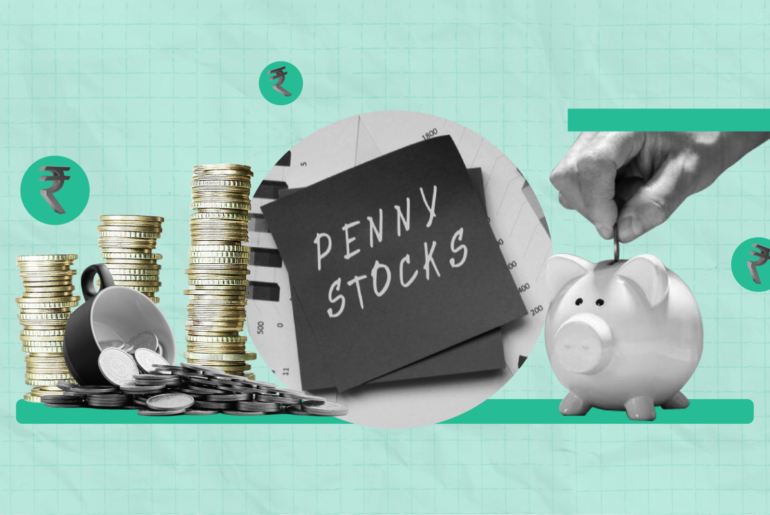Last Updated on Oct 2, 2023 by Anjali Chourasiya
There are various factors to define a company’s financial and market position, such as revenue, assets, profitability score, red flags, and more. One such factor is market capitalisation. It is a measurement of the market value of the company. In this article, let’s look at India’s top companies by market cap and learn about market capitalisation, its types and more.
Table of Contents
Top 10 companies in India by market cap – Updated October 2023
| Name | Sub-Sector | Market Cap (Rs. in cr.) | Close Price (Rs.) | PE Ratio (%) | 5Y CAGR (%) | 5Y Avg EBITDA Margin (%) | Dividend Yield (%) | Fundamental Score |
| Reliance Industries Ltd | Oil & Gas – Refining & Marketing | 15,79,162.27 | 2,345.00 | 23.67 | 15.48 | 17.55 | 0.39 | 7.71 |
| Tata Consultancy Services Ltd | IT Services & Consulting | 12,94,114.99 | 3,528.60 | 30.70 | 10.07 | 28.70 | 3.25 | 5.65 |
| HDFC Bank Ltd | Private Banks | 11,55,239.93 | 1,526.30 | 25.12 | 8.76 | 29.27 | 0.92 | 5.67 |
| ICICI Bank Ltd | Private Banks | 6,60,111.05 | 951.90 | 19.39 | 25.52 | 16.94 | 0.85 | 5.50 |
| Infosys Ltd | IT Services & Consulting | 5,95,737.36 | 1,435.45 | 24.72 | 14.48 | 27.12 | 2.36 | 5.68 |
| Hindustan Unilever Ltd | FMCG – Household Products | 5,78,081.69 | 2,465.60 | 57.12 | 8.92 | 24.37 | 1.59 | 6.46 |
| ITC Ltd | FMCG – Tobacco | 5,49,655.56 | 444.40 | 28.64 | 8.34 | 38.92 | 3.50 | 6.67 |
| Bharti Airtel Ltd | Telecom Services | 5,40,569.28 | 926.40 | 64.77 | 22.76 | 34.34 | 0.44 | 7.07 |
| State Bank of India | Public Banks | 5,26,507.48 | 598.55 | 9.46 | 17.65 | 10.24 | 1.92 | 5.49 |
| Bajaj Finance Ltd | Consumer Finance | 4,68,311.80 | 7,810.75 | 40.70 | 29.22 | 31.33 | 0.39 | 5.90 |
Note: The data listed here are taken from Tickertape Stock Screener. The stocks are listed based on the market cap (from high to low) as of 1st October 2023.
Fundamental Score: It is a smallcase proprietary score between 1 and 10 assigned to stocks listed on the NSE. The score helps rank the stock over other stocks in the respective sector. The higher the score, the better the company. The score is calculated considering factors like valuation, profitability, market share growth, financial health and earnings growth of the company.
Details of top 10 listed companies in India by market cap
Reliance Industries Ltd
Reliance Industries (RIL) is on a roll; they have ticked all the boxes right. Currently, they have the bragging rights for being one of the most valuable companies in the world with their large market capitalisation of over Rs. 15,79,162.27 cr.
Headed by Mukesh Ambani, RIL has diversified business parallels with telecommunications, energy, petrochemicals, textiles, and retail. Reliance Industries alone accounts for nearly 5% of the revenue of the government of India from customs and excise duty. The 5-yr CAGR of RIL is 15.48% and provided 1-yr returns of 11.08%.
Tata Consultancy Services Ltd
TCS is the largest information technology company in India as per market capitalisation. Headquartered in Mumbai, TCS has 72.19% of promoters holding. It’s a subsidiary of the Tata Group and has operations in 46 countries. The company’s market cap is Rs. 12,94,114.99 cr., providing a 5-yr CAGR of 10.07% and 1-yr returns of 17.73%.
HDFC Bank Ltd
Established in 1994, HDFC Bank is one of the largest private sector lenders in the country. The company has expansive operations in finance, insurance, consumer banking, wealth management, and private loans. The company’s market cap is Rs. 11,55,239.93 cr., providing a 5-yr CAGR of 8.76% and 1-yr returns of 10.41%.
ICICI Bank Ltd
This privately owned financial institution has percolated the Indian market within a few years. Founded in Vadodara, ICICI Bank offers a variety of banking services to both retail and commercial clients. In addition, through its subsidiaries and sister concerns, ICICI Bank has explored asset management, investment banking, life insurance, and venture capital sectors.
The market cap of ICICI Bank is Rs. 6,60,111.05 cr., and the 5-yr CAGR is 25.52% and provided 1-yr returns of 12.80%.
Infosys Ltd
After TCS, Infosys is the country’s second-largest multinational information technology giant. It was founded 39 years ago, in 1981, by NR. Narayana Murthy. The company offers outsourcing, managed services, and consulting services. The company’s market cap is Rs. 5,95,737.36 cr., providing a 5-yr CAGR of 14.48% and 1-yr returns of 2.63%.
Hindustan Unilever Ltd
Founded in 1933, HUL is a subsidiary of Unilever, an Anglo-Dutch company. HUL has a very firm presence in the Indian consumer goods market. It caters to products in domains such as foods, beverages, water purifiers and personal care products. The market cap of HUL is Rs. 5,78,081.69 cr., and the 5-yr CAGR is 8.92% and provided 1-yr returns of -8.70%.
ITC Ltd
ITC Limited is a holding company engaged in the marketing of Fast-Moving Consumer Goods (FMGC). The company operates through four segments: FMCG, hotels, paperboards, paper and packaging, and agri-business. The market cap of ITC is Rs. 5,49,655.56 cr., and the 5-yr CAGR is 8.34% and provided 1-yr returns of 33.43%.
Bharti Airtel Ltd
Based out of New Delhi, Bharti Airtel, famously known as Airtel, is an Indian multinational telecommunications company. It operates in 17 countries with more than 491 mn customers. It holds a market cap of Rs. 5,40,569.28 cr. and provided a 5-yr CAGR of 22.76% and 1-yr returns of 21.15%.
State Bank of India
SBI is the largest public sector bank in India, providing a range of products and services to personal and commercial enterprises, large corporates, public bodies and institutional customers. The market capitalisation of SBI is Rs. 5,26,507.48 cr., and it provided a 5-yr CAGR of 17.65% and 1-yr returns of 14.72%.
Bajaj Finance Ltd
Bajaj Finance Limited is a non-banking finance company (NBFC). The company is engaged in lending and allied activities. It holds a market cap of Rs. 4,68,311.80 cr. and provided a 5-yr CAGR of 29.22% and 1-yr returns of 9.94%.
Understanding market capitalisation
The market cap or m-cap is the market value of a publicly traded company’s outstanding shares. It is calculated by multiplying the number of outstanding shares by the current market value of one share.
M-Cap = Outstanding shares x Share price
It is imperative to remember that market capitalisation is dynamic and changes by the second. It has a direct correlation with the traded price of the stock. While the number of outstanding shares in the formula for market capitalisation may not change unless the company decides to issue more shares, the stock price component is extremely volatile.
There are three types of market capitalisation – large-cap, mid-cap or small-cap companies. SEBI has defined the levels determining a company according to its market cap.
- Large-cap companies: Having a market cap of Rs. 20,000 cr. or more
- Mid-cap companies: Having a market cap between Rs. 5,000 cr. to Rs. 20,000 cr.
- Small-cap companies: Having a market cap of less than Rs. 5,000 cr.
Large-cap stocks are an ideal pick for conservative investors looking to stay invested in the market for stable returns over the long term. Small-cap stocks are more suited for aggressive investors having a decent risk appetite and looking for short-term gains.
Check the difference between large-cap, mid-cap and small-cap.
Conclusion
The above-mentioned are well-established companies in India that have existed for a long time now and have strong market dominance. Market capitalisation is directly proportional to the stock’s share price; that is, it rises and falls in line with the traded price of the shares. However, there are other parameters to analyse the top companies based on the profits or sales, etc. Therefore, understand your investment goal and risk appetite before investing in any company. Also, research the company’s past performance and future goals thoroughly. For all of this, #TickertapeHaiNa!
FAQs
How to get the list of top IT companies in India?
You can use Tickertape Stock Screener to get the list of top IT companies in India based on their market cap.
- Log in to Tickertape
- Launch Stock Screener
- Select ‘Informational Technology’ under the sector
- Sort the list according to market cap
How to get the list of top pharmaceutical companies in India?
You can use Tickertape Stock Screener to get the list of top pharmaceutical companies in India based on their market cap.
- Log in to Tickertape
- Launch Stock Screener
- Search for ‘Pharmaceutical’ under the sector
- Sort the list according to market cap
How to get the list of top FMCG companies in India?
It is easy to get the list of top FMCG companies in India based on their market cap using Tickertape Stock Screener.
- Log in to Tickertape
- Launch Stock Screener
- Search for ‘FMCG’ under the sector and select the sub-sectors
- Sort the list according to market cap
What are the top 100 companies by market cap in India?
Visit Tickertape Stock Screener and sort the list by market cap to get the list of the top 100 companies by market cap in India.
- Are high market cap companies good?
High-market cap companies are large-cap companies which have established a strong presence in the market. Compared to small-cap companies, large-cap companies are considered less risky. Large-cap companies can be a good choice for less aggressive investors with less risk appetite. However, it is always better to discuss this with your financial advisor.
- Best Fundamentally Strong Penny Stocks (2024) - Apr 10, 2024
- Best Liquor Stocks in 2024 - Apr 4, 2024
- All Pharma Penny Stocks in India: Pharma Shares Below Rs. 50 - Apr 2, 2024







